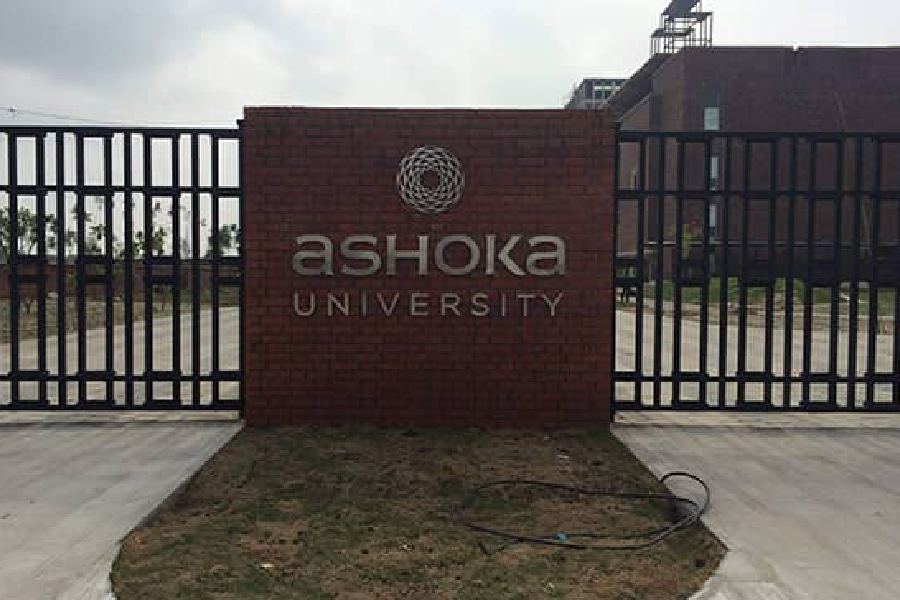Competing caste aspiration, a likely theme in the forthcoming elections, has filtered into new precincts.
A student group at Ashoka University is on a dharna demanding a caste census among students and the implementation of reservation at the private institution in Sonipat, Haryana.
While a co-founder of the university ruled out a caste census by the administration, the authorities flagged a slogan — “Brahman-Baniyavad Murdabad” — allegedly shouted by some protesting students and hinted at possible action.
The Social Justice Forum (SJF), which represents students from the Scheduled Castes, Scheduled Tribes, Other Backward Classes and minority communities, launched the indefinite dharna on the campus on March 20. It was shifted outside the main gate on March 26.
The SJF’s demands stem from its analysis of caste data provided voluntarily to the university by two-thirds of the students during admission. Extrapolated, the results suggest that only seven per cent of the university’s 2,300 students are Dalit, tribal or OBC, an undergraduate student and SJF member said.
Being a private university, Ashoka does not implement reservation in admission or teacher recruitment. It has very few Dalit, tribal or OBC teachers, the student said.
A video circulated on X shows a group of sloganeering students in front of a lecture hall, shouting: “We demand a caste census, we demand reservation at Ashoka; Brahman-Baniyavad Murdabad.”
A post on X from the SJF explained the context. “The SJF successfully disrupted Founder Sanjeev Bikhchandani’s ‘Masterclass on Branding’ Talk held at 12 pm on 22nd March. We called for caste census, condemned the prejudicial foundations of the university and marched back to the atrium continuing our chant,” it said.
“This demonstration fructified after a few days of sit-ins, it was only after this that the VC reached out for an address to discuss demands.”
The slogan “Brahman-Baniyavad Murdabad” has attracted criticism on social media and a statement of condemnation from the university.
“Ashoka University attaches great value to freedom of expression and vigorous debate, but it also attaches great importance to mutual respect. The university deplores expressions of hatred directed against any individual or group,” Ashoka posted on X on Wednesday.
“Ashoka University’s Guidelines on Protecting Freedom of Expression have clearly laid down that such freedom of expression is not unlimited and enjoins respect for the rights and sensibilities of others. This is essential to preserving the spirit of community at Ashoka.”
Indicating possible punishment, the statement added: “Actions that make the atmosphere intimidating, threatening or hostile to individuals or groups are therefore regarded as serious offences and are subject to University disciplinary procedure. The University will take all measures necessary to ensure that peace and harmony in the campus is not disturbed.”
The SJF member said “Brahmanvad” and “Baniavad” referred to the institutionalisation of social hierarchy, and should not be seen as criticism of members of these communities.
Bikhchandani, a co-founder of the university, denied any disruption at the March 22 protest and rejected the demand for a caste census.
“The protesting students came and stood outside the door of the class during the ten minute break after the first hour of the class,” he posted on X.
“They shouted slogans for two or three minutes and then went away. I was inside the classroom in a conversation with some students. We continued the conversation without interruption.
“I had been given prior notice that this would happen and I should not get alarmed. All very civilised. No disruption. My advice to the protesting students — Ashoka is a small community. You want a census — do it yourself. Don’t depend on the admin to do it.”
The SJF has countered the university’s statement. “We note that Ashoka University official’s stance is ‘deplor[ing] expressions of hatred against any individual or group’. In this vein it becomes paramount to highlight the discrimination present within the walls of Ashoka,” it said.
“Furthermore, we would like to highlight that considering these slogans hate speech amounts to the assertion that Brahmins are a marginalised or protected group when this is not the case.”
It added: “The fact that the overwhelming majority of the nation’s population receives such limited inclusion and representation in Ashoka University suggests that the institution has neither been able to cultivate any sense of constitutional morality nor has it been able to make a just democratic space. It is not an exaggeration to claim that Ashoka University as an institution is a reproduction of the caste system at its core.”
The Ashoka University Student Government (AUSG), an official student body recognised by the university, has expressed support for the SJF’s demand.
“We agree with all the demands of the SJF. We want the university to conduct the survey because any such exercise done by students is not acknowledged by the university,” a member of the AUSG said.
He said some students had in 2019 conducted a sample survey of students and found that SCs, STs and OBCs made up less than 10 per cent of the total student population at the university. But, he said, the university did not accept the findings.
An email has been sent to vice-chancellor Somak Raychaudhury seeking the university’s comments on the SJF’s demands and its protest. His response is awaited.











